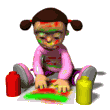
Developmental Cognitive Neuroscience Laboratory: Faculty Publications
Document Type
Article
Date of this Version
November 2004
Abstract
Clinical assessment of executive function in preschool-age children is challenging given limited availability of standardized tasks and preschoolers' variable ability to participate in lengthy formal evaluation procedures. Given the benefits of ecological validity of measuring behavior by rating scales, the Behavior Rating Inventory of Executive Function (Gioia, Isquith, Guy, & Kenworthy, 2000) was modified for use with children ages 2 through 5 years to assess executive functions in an everyday context. The scale development process, based on samples of 460 parents and 302 teachers, yielded a single 63-item measure with 5 related, but nonoverlapping, scales, with good internal consistency and temporal stability. Exploratory factor analyses identified 3 consistent factors: Emergent Metacognition, Flexibility, and Inhibitory Self-Control across parent and teacher samples. In a second study with a mixed sample of preschool children with various developmental disorders, parents and teachers rated these preschool children as having greater executive difficulties in most domains than matched controls. Such rating-scale methodology may be a useful complementary tool by which to reliably assess executive functions in preschool children via everyday behaviors in the natural environment.

